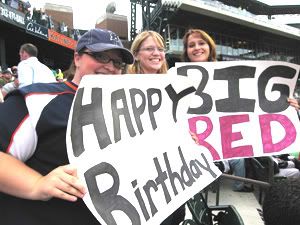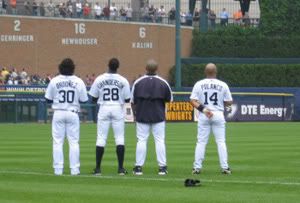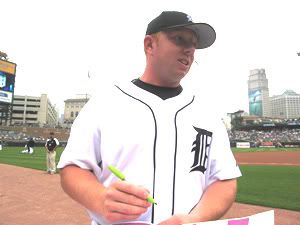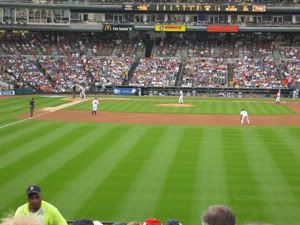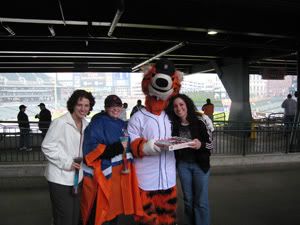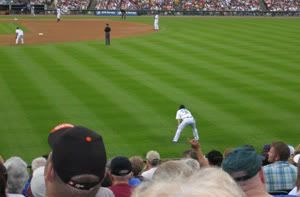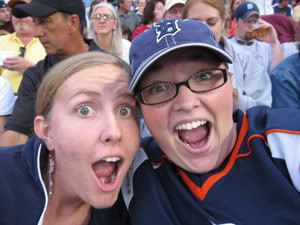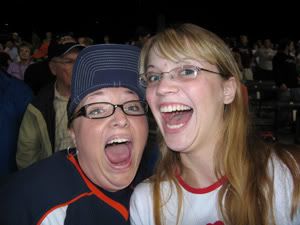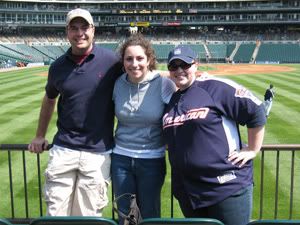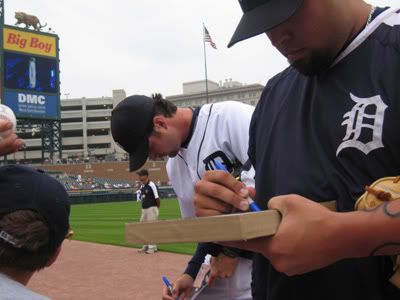Here are a couple of stories in today's paper that made me tear up about my
Tigers!
MEET THE AMAZING TIGERS: It's about charisma, bonding
From the boss to the gum-chewer
July 13, 2006
They have made summer nights relevant once again.
The Tigers are the major leagues' best team, led by a charming curmudgeon, sparked by a little-known cast of characters and supported by a city that has reason to believe in baseball again. As the season's second half begins tonight at Comerica Park, the notion of a Detroit team in the World Series no longer resides in the distant past or whimsical future.
This is a look behind the scenes of the men who have made it happen. If you haven't paid attention -- and many fans haven't for nearly two decades -- it's time to learn about Nate Robertson, the bespectacled southpaw who started a gum-chewing trend; Jeremy Bonderman, the avid outdoorsman with a throwback work ethic; and Joel Zumaya, the rookie who has thrown 101-m.p.h. fastballs and reminds everyone how much fun baseball is supposed to be.
And then there's the rest of the team that reached the All-Star break with a 59-29 record and a two-game lead in the American League Central over the Chicago White Sox, the defending World Series champions. The Tigers have done it without the sort of superstar who has spent his entire career in Motown. There is no Steve Yzerman, Isiah Thomas, Barry Sanders -- or Alan Trammell.
But the Tigers do have manager Jim Leyland.
A baseball team often assumes the personality of its manager or its superstar. Leyland, 61, may be both. Considered by some a genius at dealing with people, Leyland tends to stars and role players with equivalent ease.
After a game, Leyland often addresses the media while smoking a Marlboro, with his stocking feet propped on his desk. Sometimes, he asks the questions, as was the case in Seattle last weekend. He told Japanese media members how excited he was to meet Mariners star Ichiro Suzuki, then asked about their country and discussed, among other things, the Tokyo subway system and his affinity for Japanese food.
He is the Tigers' most charismatic skipper since Sparky Anderson. The defining public moment of his first months on the job surely came April 17, during an impassioned postgame news conference. It lasted less than one minute, but the substance of the address ("We stunk") demonstrated that he would not tolerate the sort of lackluster performance that produced that day's 10-2 loss to Cleveland. The city noticed, even during the NBA and NHL playoffs.
More importantly, Leyland's players received, understood, and appreciated the message. They were not offended. In fact, the mood was such that several players, coaches and even a flight attendant engaged in a heart-to-heart talk on that evening's flight to Oakland, Calif. They talked mostly about relationships -- "wives and girlfriends," outfielder Curtis Granderson said -- but the subject was beside the point. A team known for its 2005 divisiveness was talking, and in the process formed a close-knit identity.
"We were serious, we joked around, and we learned," said Granderson, who initiated the conversation, along with teammates Craig Monroe, Marcus Thames and Chris Spurling after concluding that he did not want to sit through a five-hour flight in silence. "It was good."
It is now to the point that Leyland, who prides himself on being surprised and impressed by very little, is letting his emotions out. "I love this group of guys," he said last week. "I'll do anything for them."
Three All-Stars are team leaders
Three Tigers traveled to Pittsburgh this week to play in the All-Star Game: left-handed pitcher Kenny Rogers, catcher Ivan Rodriguez and rightfielder Magglio Ordonez.
All three had been to All-Star Games before. All three have played in the postseason. All three are considered clubhouse leaders, but in an understated way. And all three appear happier this season than last.
Rodriguez, a future Hall of Famer, endured a divorce and unsatisfying season in 2005, all while his relationship with Trammell, then the manager, turned sour. This season, by contrast, he has spoken of his great respect for Leyland. His numbers are up. He has a girlfriend. His son, Dereck, has often accompanied him to the ballpark. Rodriguez seems comfortable enough that, this month, he restated a desire to finish his career as a Tiger.
Ordonez is halfway to what would be his first full, healthy season since 2003. He seemed deeply appreciative of his All-Star selection as evidence of his return to the game's elite. He is a quiet star who nonetheless has an elevated clubhouse status. The team's younger Latin American players seem drawn to his easygoing personality.
Rogers, 41, may be the most intriguing '06 Tiger. Before last season, he seemed likely to spend the remainder of his big-league career with the Texas Rangers, near his Southlake, Texas, home. Then came altercations with two cameramen. He subsequently endured the scorn of almost every fan, talking head and sports columnist in the country.
But time has passed, Rogers rebounded, and the Tigers have been the ultimate beneficiaries. His All-Star Game start rewarded a superb first half. He is well liked by his teammates -- the younger pitchers, especially -- and cordial with the local media. He has been self-effacing when asked about his success. He grew teary-eyed after learning of his All-Star selection, and he said of Detroit: "I chose the right place." This seems, by all accounts, to be a person who had one bad day last season, and many more good ones this year.
The All-Stars, though, are only three of 25 players. Good teams have a cast of characters, and this one does.
Mutual respect in the clubhouse
The clubhouse is generally void of combustible personalities, and is instead the residence of touching success stories (Thames), folksy baseball lifers (left-handed reliever Jamie Walker), and resilient hardball sages (backup catcher Vance Wilson).
Perhaps the most important aspect of the team's off-field evenness has been the mutual respect between the veterans and the young players.
Young stars Granderson, Zumaya, and pitcher Justin Verlander, for example, spent half an hour having their pictures taken at Comerica Park for a recent spread in ESPN The Magazine. Yet, there was no discernible grumbling by veterans about attention given to the younger players, as copies of the issue circulated through the clubhouse in Seattle last weekend. "Good for the city," Walker said. "It gives us exposure."
It may help that the three are easy to like. Granderson, 25, is the diligent worker who often arrives at the ballpark in neat, pressed attire. Verlander, 23, is the son of a Chevy-driving union negotiator, who already has the polish and know-how of a veteran ace. Zumaya, 21, may be the team's youngest player, but he has enough personality to fill a room. He was not afraid to hang a Mexican flag above his locker during soccer's World Cup.
The team's young/old dynamic is best illustrated by the rotation, which includes three pitchers -- Bonderman, 23; Robertson, 28; and Mike Maroth, 28 -- who started games for the 119-loss Tigers in 2003. They are better, more experienced pitchers than three years ago -- or last summer, even. "It was time for them to graduate a little bit," Leyland said. "They've done that."
Bonderman became a father this season. Robertson, the team's only year-round Michigan resident, is perhaps one of the most recognizable Tigers, thanks to his 3.36 ERA and penchant for Big League Chew, which he shoves into his mouth when the Tigers need to rally. Maroth, who lost 21 games in 2003, sparkled early this season before he had to undergo surgery to remove bone chips from his elbow. His return date remains uncertain. Leyland, as a matter of principle, does not comment on injured players, but he has been so impressed with Maroth's rehabilitation efforts that he became emotional when talking about him last weekend. "He's such a nice guy, a polite guy, that sometimes you forget what a competitive spirit he has," Leyland said.
The ultimate heartrending story on this team, though, is that of Thames, the journeyman outfielder. He grew up in a low-income Mississippi household. His mother was paralyzed in a car accident when Marcus was 5. He served in the National Guard for four years. He has friends who have fought in Iraq.
He hit a home run on the first big-league pitch he saw -- at Yankee Stadium, off future Hall of Famer Randy Johnson -- but he had never found a regular job in the majors. He changed organizations twice, before hitting .335 with 46 home runs in 137 games over two seasons at Triple-A Toledo -- under the watchful eye of super-fan/birddog scout Larry Leyland.
Larry Leyland would not let his brother forget about Thames. He talked incessantly about how he deserved to be in the big leagues. And this year, at long last, Thames has shown why. He's hitting .297 at the break and could finish with 40 home runs.
Playing well and having fun
Thames' tale suggests there may be something larger at work with these Tigers -- even as the younger players remind everyone that there is a still a place for sophomoric fun in the big leagues. Last month, Granderson discussed with Bonderman the optimal technique for ambushing a teammate with a bucket of ice water. Bonderman listened, followed the instructions, and doused an unsuspecting Wilson while he was in the bathroom at Chicago's U.S. Cellular Field.
The Tigers are having fun and playing well. They appear to have it, the intangible quality possessed by champions and could-be champions. The late-1980s Pistons had it. The mid-1990s Red Wings had it. The Ben Wallace-led Pistons had it. It causes fans to fear missing a game, or even an inning, because they do not know when the next memorable moment will arrive.
This season may end in heartbreak. Playoff baseball could remain a mirage. For now, though, one thing is clear: Baseball is relevant again in Detroit.
One month into the season, closer Todd Jones, now in his second tour of duty as a Tiger, was asked what it felt like to be part of the game's rebirth in Detroit. The season was still young at that point, too early to know if the fast start would even carry until the All-Star break. At that time, Jones told his interviewer, "I really hope we're having this conversation in July."
Well, it's July 13. The second half starts tonight. The White Sox will be here in less than a week. And Detroit is talking baseball again -- maybe for good.
TIGERS' PLAYOFF BID: 5 reasons they'll make it, 5 reasons they won't
July 13, 2006
BY JON PAUL MOROSI
FREE PRESS SPORTS WRITER
Maybe they'll win like the 2005 White Sox, who swept the World Series, broke a curse and lost only one postseason game.
Maybe they'll tease like the 2004 Yankees, who seemed certain to win a 27th world title before an epic collapse against Boston in the AL Championship Series.
Or maybe they'll fade like the 2003 Braves, who faltered in the NL Division Series against the Chicago Cubs.
In less than four months, everyone will know how the 2006 Tigers used the status they share with Chicago, New York and Atlanta -- baseball's best team at the All-Star break.
There are reasons to clear your October calendar, in anticipation of the city's first postseason baseball in nearly two decades. And there are also reasons to wonder whether the state's most important October sporting event will take place in Ann Arbor between the Spartans and Wolverines.
So here are five rationalizations for the optimist, and five more for the skeptic.
REASONS THE TIGERS WILL MAKE THE PLAYOFFS
1. They're too far ahead to blow it.
The 2006 Tigers could start to play like the 2005 Tigers and still might make the postseason. Detroit was 59-29 at the break. Since the wild card's arrival in 1995, only four teams -- the '01 Mariners, '98 Yankees, '98 Braves, and '95 Indians -- had a halfway win percentage that matched or exceeded the Tigers' .670. Three reached the World Series. The one that did not, the '01 Mariners, won an AL-record 116 games.
What's more, during the wild-card era, all 11 teams that had baseball's best record at the break have reached the postseason. The key number to remember here is 95 wins. In the 10 full seasons played with the wild card, 23 AL teams have won 95 or more games. All 23 reached the postseason. The Tigers can play under .500 (36-38) and win that many games by season's end.
2. The schedule is favorable.
The Tigers have 19 games left against the Royals and Indians -- teams against which they are 15-3 this season. And though Detroit does have difficult series in Chicago (six games), Boston (three games) and New York (three games), the Tigers also have the most road wins (33) in baseball.
3. Starting pitching wins. And the Tigers have it.
Detroit has the best pitching staff in baseball this year -- by a large margin. The Tigers' team ERA (3.46) is almost a half-run better than the next team -- the San Diego Padres (3.91) -- and is well ahead of the L.A . Angels (4.07), the closest AL team.
Kenny Rogers started the All-Star Game. Jeremy Bonderman and Nate Robertson are on pace for career highs in wins. Mike Maroth would have been, too, had he not needed elbow surgery. Rookie Justin Verlander has been fantastic. Zach Miner has emerged in Maroth's absence.
4. Offensive stars are performing.
Ivan Rodriguez, the AL's starting catcher on Tuesday night, appears strong. He talked earlier this month about playing three years beyond the end of the guaranteed portion of his current contract, which runs through next season. The signs from Magglio Ordonez are equally encouraging. He hit .312 with 16 home runs and 62 RBIs in the first half. Those power numbers exceed his output in each of the two previous, injury-plagued seasons. He could finish with 30 homers and 120 RBIs -- something he has done twice before.
5. They're playing defense.
The Tigers have been baseball's most efficient defensive team, according to ratings calculated by Baseball Prospectus. Detroit, by contrast, ranked 15th in last year's rankings, which measure the rate at which balls in play are converted to outs.
REASONS THEY'LL MISS THE PLAYOFFS
1. Bullpens are volatile by nature. Detroit's is no exception.
On nights when the Tigers' starting pitcher goes six or seven innings, followed by a fireballing Joel Zumaya, flummoxing Fernando Rodney and still-good-enough Todd Jones, the Tigers are almost unbeatable. The question, though, is how reliable the bullpen will be in August and September.
Zumaya has been so impressive it is easy to forget he is a 21-year-old rookie. Rodney's month-by-month ERA has increased steadily, from 0.00 in April, to 2.08 in May, to 5.17 in June, to 19.29 in July. Jones has 23 saves in 26 chances, despite allowing an opposing batting average of .302.
2. A reliance on home runs could be Detroit's downfall.
The Tigers have hit 117 home runs this season -- their most before the All-Star break in a dozen years. The power display has been welcome -- necessary, even. Manager Jim Leyland has admitted that the Tigers are not a running team.
Although Detroit has shown enough guile to go 15-9 in one-run games, it may need to get more creative with its run-scoring methods to win the division.
3. Consider the experience of the team's pitchers -- in both directions.
Rogers has been superb, but he did allow four-plus runs in each of his last three starts, none of which lasted through the sixth inning. Last season, his ERA was 2.54 before the break and 4.72 after it. Now, though, he's out of the Texas heat -- which could play a significant role in his July/August performance.
Leyland said recently that Bonderman, Maroth and Robertson have "graduated" as big-league pitchers. They still must improve upon their career second-half ERAs -- 5.13, 4.94, and 5.90, respectively.
4. Tigers must adjust offensively.
Chris Shelton was the talk of baseball in April. The summer cool-off since then has been dramatic. He hit .205 in June but is at .367 so far this month, an encouraging sign. In general, though, unless Shelton shoots doubles into the gaps, he may be the best example of the team's home-run reliance. Craig Monroe and Brandon Inge have supplied needed power this season, but they need to improve on their performance against right-handed pitchers. Monroe is hitting .256 against them, Inge .221.
5. Injuries or trades could affect on- and off-field performance.
Leyland has consistently played down the role of clubhouse chemistry in his team's success. He said before the All-Star break that talent beats chemistry every time. Yet there is no denying how well this team gets along.
That could change if key players are taken off the roster, either by an injury or trade. For the same reasons, the manner in which Dmitri Young returns after a stint in a rehabilitation clinic will bear watching.
